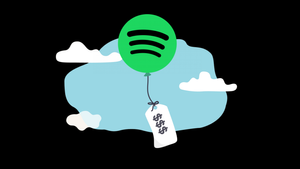Many in the music industry have long argued that streaming subscriptions are under-priced. So, Spotify instigating a second round of price increases in under a year would likely be widely welcomed, if it wasn't for the streaming service’s sneaky bundling tricks causing a new controversy. However, Spotify’s investors, who were also pushing for a price hike, have responded positively to the latest increase in subscription prices.
According to Yahoo Finance, JPMorgan analyst Doug Anmuth last week welcomed the news that Spotify is increasing its subscription prices again in various markets, including the US where different subscription packages will increase by $1-3 next month.
He predicted that the increases will have minimal impact on total subscriber numbers while nicely boosting the streaming service’s revenues. That’s based on the fact that, following the previous price increases in 2023, churn at Spotify - the number of cancellations - was “in line with expectations”, while the signing up of new subscribers was “better than expected”.
This suggests that “the company has pricing power”, he wrote. “Spotify’s deep data and strong content curation, personalisation, discovery and ubiquity are best-in-class and hard to replicate, making it unappealing for consumers to switch platforms”.
“Looking ahead”, he added, “we expect a more normalised cadence of price increases across the music streaming industry”. So such price hikes will become more regular across the sector as time goes on. This is something that another analyst - Benjamin Swinburne at Morgan Stanley - said should definitely happen in his own commentary on the price rises.
“Given the size of these Spotify increases and the frequency, second time in less than a year”, he wrote, “we believe” that other streaming services “should follow suit”. Although, he added, Spotify’s competitors “may not have the same pricing power as Spotify and may be more reluctant broadly”.
It was initially Spotify that was most reluctant about increasing subscription prices. The baseline price for a music streaming subscription in North America and Western Europe was 9.99 a month for fifteen years. So, when inflation is taken into account, the price was actually going down every year. Given the music industry has a revenue share arrangement with the services, by the start of the 2020s many in the industry were calling for the prices to be increased.
The streaming services, and especially Spotify, seemed nervous about price increases, even though video streaming platforms had regularly put up the price. However, there are differences between music and video streaming, in particular the video services can compete on catalogue, whereas all the music services basically offer the same 100 million+ tracks.
Nevertheless, the price was going to have to increase at some point, and ultimately Deezer, and then Apple, Amazon and YouTube, accepted the inevitable. Finally, Spotify followed suit last summer.
Since then, Spotify has seemingly become a lot more gung ho when it comes to further increases in price. Partly because of the limited impact of the first round of increases on subscriber numbers, and partly because the company is under increased pressure from investors to become a profitable business.
As well as putting up the prices, Spotify has also been reshuffling the subscription packages it offers, in particular in relation to audiobooks.
For example, in the UK, although the cost of a Spotify premium subscription went up by £1 to £11.99 last month, customers can actually avoid the price rise if they opt for the new £10.99 music-only tier which has been quietly launched. That just means they lose the fifteen hours of audiobooks access that was added to the main premium package last year.
In the US, this reshuffling has proven very controversial because of the impact it has on what Spotify pays songwriters and music publishers under the compulsory licence which streaming services utilise in the American market.
By offering audiobooks as a standalone package and as part of its main premium package, Spotify has reclassified the main package as a bundle. This reduces what it has to pay under the terms of the compulsory licence. Or at least, so says Spotify. The collecting society that administers the licence - The MLC - disagrees and has sued the streaming service.
Whatever the rights and the wrongs of that bundling dispute, it means that the music industry hasn’t been hailing the latest round of Spotify price increases, because - for songwriters and publishers - there is no benefit. In fact, it means that the payments they receive will go down.
Though, for Spotify’s investors - who have been pushing for both price increases and cost cutting as part of the streaming service’s bid to become profitable - both outcomes of the latest round of pricing and subscription changes will be seen as positive. Unless, perhaps, the bundling dispute results in high legal costs and significant reputation damage.

